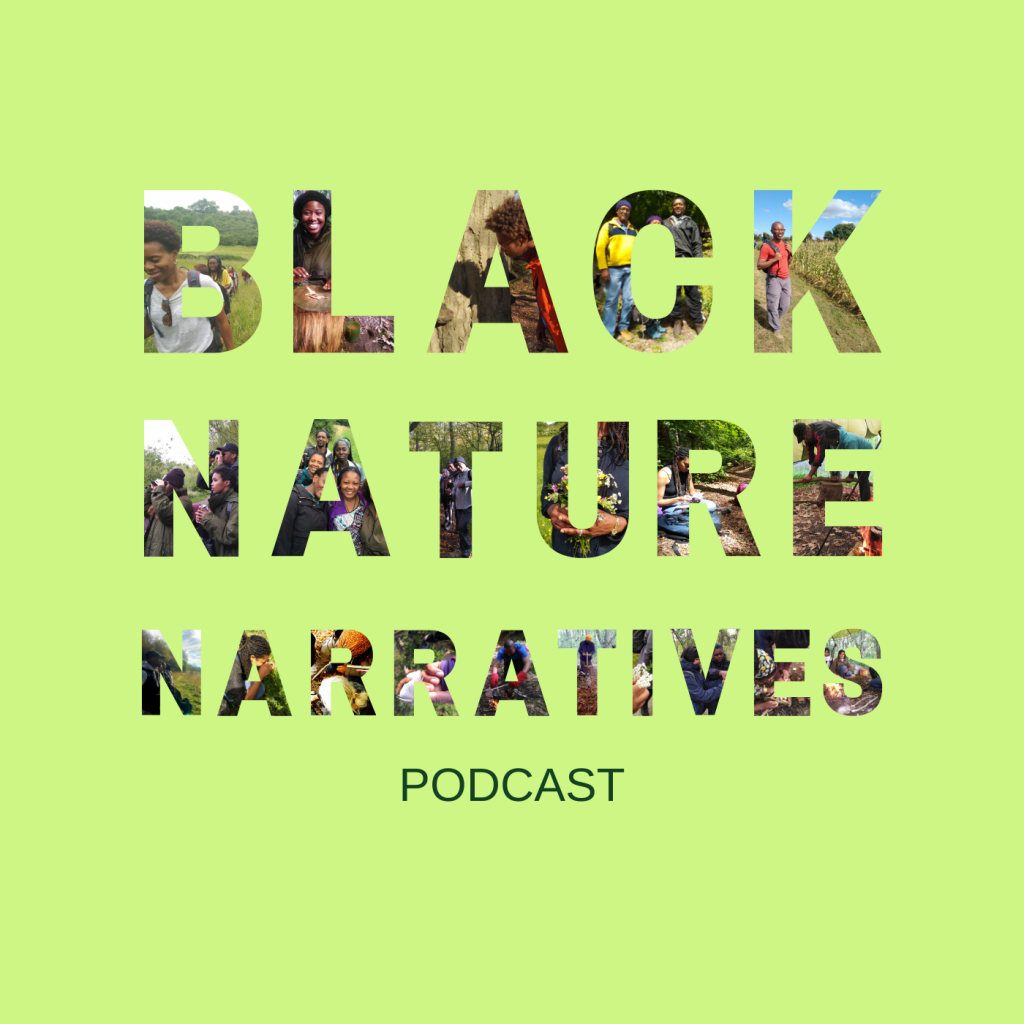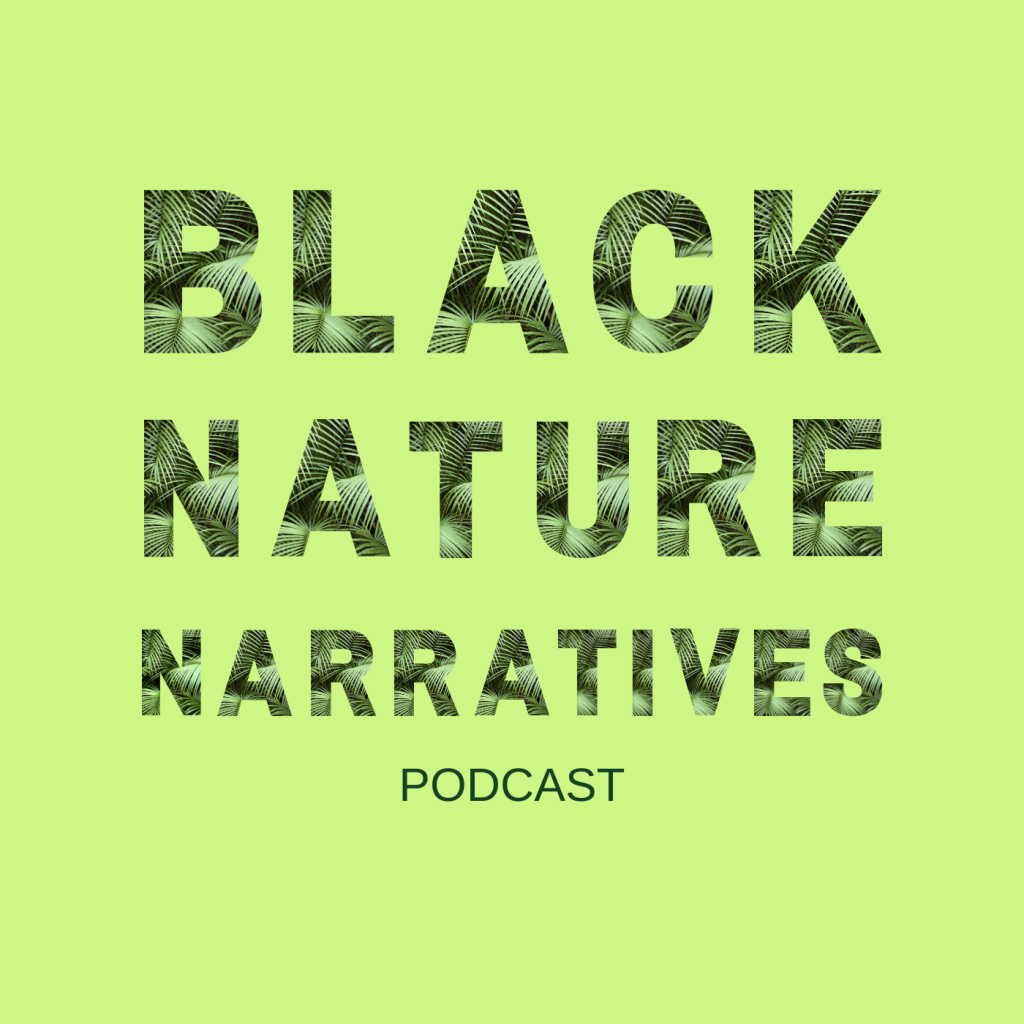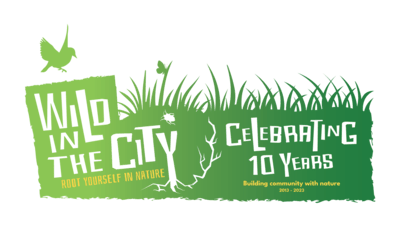
Podcasts

Black Nature Narratives
Black Nature Narratives offers black perspectives on issues relating to the natural world and our relationship with nature. Hosted by Nature Allied Psychotherapist and Naturalist, Beth Collier.
Here we’ll celebrate our love of nature and share inspiration from black leaders within conservation, ecology, outdoor education and environmental justice talking about their work and journeys into a field with low representation of black people; highlighting voices less heard within the environmental field.
We’ll also be exploring the historical legacies and lived experience which impacts on how we see ourselves as part of nature or as belonging within natural spaces and environmental organisations; giving consideration to how our presence and perspectives can become politicised when our lived reality diverges from the mainstream narrative.

Help us to continue our programme of work supporting well-being through relationship with nature and building a community of people of colour in who gather in nature.
Latest Episodes: Series 3
In Series 3, we hear from British leaders in the environmental field discussing their use of and relationship with land and animals, bringing down barriers to access for people of colour, their journey into working within the environmental field and the challenge of racism.
In 2020, during lockdown, Beth met virtually with Black leaders from across the UK whose work and passion is to tend land, animals or open up areas of landscape and study to people of colour, challenging historical perceptions of exclusivity, as we contemplate the politicisation of Black presence in nature.
Titus Agbara is a prize-winning painter who believes that art is humanity’s quest for the truth, either consciously or unconsciously, and that it is inexhaustible. The quest for the never-ending truth, which he calls “individualistic tendency”, enables his exploration of colour and texture. His compositions portray everyday happenstance and landscapes. He seeks to convey the truth and sees his life and travels as a “large expanding mosaic where the whole is greater than the individual part”. Find out more about his work at titusagbara.wixsite.com
Maxwell Ayamba, BEM, is an Environmental Journalist by profession and an academic. In 2003, he co-founded the Sheffield Black & Ethnic Minority Environmental Network (SHEBEEN). He is passionate about nature and a keen walker. For over 20 years, he has promoted access to and participation in the British countryside and open green spaces to people from BAME communities. In January 2023, Maxwell became a ‘Medallist of the Order of the British Empire (BEM)’ for services to the Environment and to the community in Sheffield, South Yorkshire. For more about Maxwell and his work, visit semcharity.org.uk
Dr Mandisa Greene, the first Black woman to lead the Royal College of Veterinary Surgeons (RCVS), describes herself as a “Vet Surgeon, wife, mummy to two boys, two cats | President of Royal College of Veterinary Surgeons council (RCVS).” In this wide-ranging conversation with Wild in the City founder, Beth Collier, Dr Greene talks about growing up in Trinidad, her childhood love of animals, studying veterinary medicine in the UK, and becoming a leader of colour in a space in a predominantly white space. Follow Dr Mandisa Greene on Instagram @drmandisathevet
Zimbabwean-born David Mwanaka was the first African farmer to grow white maize in the UK. In 1991, Mwanaka left his job as a journalist, due to the uncertainty of Zimbabwe’s politics and economy. He went on to establish Mwanaka Fresh Farm Foods, which has now diversified into various products in Britain. In this conversation with Wild in the City founder, Beth Collier, David talks about his journey from Zimbabwe to Britain, how he made the transition into farming, and the joys and challenges of being a rare Black landowner and farmer in the UK.
Francisca Rockey is an award-winning geographer, campaigner, influencer, advocate and activist who is regularly involved in social campaigns and charity fundraising. She is also a blogger, writer and public speaker featured in mainstream and online media. She founded Black Geographers, a community interest company working to tackle the erasure of black people in geography by creating a platform for black geographers to network and connect. The platform has a global audience of over 10,000 members. Find out more at blackgeographers.com.
This interview was recorded in 2020.
Series 1
In Series 1, Beth speaks with African-American academics, practitioners and activists working within nature education, environmental justice, youth engagement, faith and civil rights organisations. They’re speaking on themes of black history, black-centred activism, black leadership within predominantly white environmental organisations, civil rights legacies and encouraging greater black participation within the environmental field.
In this episode Beth is talking with Dr. Mamie Parker, a biologist and the first African American female Chief of Staff at the US Fish and Wildlife Service and former Head of Fisheries. She considers her first mentor in the outdoors to be her mother who would take her fishing as a child and share life lessons. Listen in to hear Dr Parker offer inspiration about navigating white dominated spaces, as the first child to integrate her school in Southern Arkansas and in her career progression within the environmental field.
In this episode Beth is joined by Destiny Hodges and Audre’ana Ellis, students at Howard University and leaders within the environmental justice movement. Listen in to hear what studying at an HBCU means to them, their sense of responsibility to the community in DC, their thoughts on the idea of environmentalism as a white endeavour and their hopes for careers within the environmental field. We were speaking together during a break at a Smithsonian conference for Women Environmental Leaders.
In this episode Beth is talking with Katherine Egland, Chair of the NAACP Environmental and Climate Justice Committee. Katherine is a veteran civil rights activist who ‘took her earrings off’ and stepped into environmental justice activism after Hurricane Katrina devastated her home community in Mississippi; just 5 years later the BP oil spill contaminated the same area.
In a current campaign she raises awareness of how UK import practices aimed at reducing emissions are negatively impacting black communities in the southern United States.
Katherine’s journey into activism was greatly influenced by her early experiences marching with Dr Martin Luther King and attending the funerals of her community leaders, Vernon Dahmer and Medgar Evers, both of whom were murdered by members of the Ku Klux Klan. Listen in to hear Katherine’s insights as an elder who’s work has fought for principles of environmental justice to be held as inseparable from civil and human rights.
In this episode Beth is talking with Dr. Ka’mal McClarin, a Frederick Douglas scholar and Curator of the Frederick Douglas House Museum within the US National Park Service in Washington DC.
Douglas was a highly accomplished man; having escaped enslavement, he was an intellectual who became a statesman, advancing the cause of abolition and social reform – he also found time to pursue his interests as a keen naturalist.
New research is helping to build an even richer picture of Douglas’ life. Listen in to hear Ka’mal’s research on Douglas’s life in relation to the natural world, as we sit talking at Cedar Hill – Frederick’s home and smallholding.
In this episode Beth is talking with Eboni Preston, Director of Programmes for the Greening Youth Foundation, a national non-profit in the US.
Listen in to hear how this Atlanta based organisation has partnered with the National Park Service to increase opportunities for African American young people to enter environmental careers.
In this episode Beth is talking with Nana Firman who is the Muslim Outreach Director at GreenFaith, an international non profit multi-faith climate and environmental organisation.
Listen in to find out how religious congregations can contribute to education and social engagement on environmental issues, and the importance of highlighting and interpreting the value of nature through existing theology.
Series 2

In Series 2, Beth is speaking with leading African conservationists about their work and the environmental issues affecting their regions and local communities. Experts from Kenya, Uganda and DRC shared innovative and traditional approaches to caring for species and habitats and discussed the wider political dynamics of colonialism that contextualises the work of black African conservationists.
A shared aim within their work is to support bio-cultural diversity, recognising the integral value of nature to cultural life and respecting indigenous communities’ intimate knowledge of ecological systems and the symbiosis which sustains both biodiversity and human communities. As researchers, conservationists and educators, they share a wealth of knowledge about community based conservation drawing on the expertise of the indigenous communities that they work alongside.
We explore the damage of a continuing colonialism which affects access to funding and who gets to lead within the environmental field and imposes western models of conservation which ignores the views of indigenous and local communities and disregards traditional ecological knowledge – unless appropriated. This is ‘divestment conservationism’ that has led to the disenfranchisement of Africans from nature and their ancestral land, inflicting twin traumas upon forest peoples; the trauma of being separated from the land – nature is integral to life – and trauma from the manner in which people were separated from nature, through violence, deceipt and disregard for the culture, livelihoods and lives of forest peoples.
A consistent theme that African environmentalists face are the obstacles created by western interests and colonial mindsets, which get in the way of caring for the environment. Conservation work is navigated through needing to advocate for a plethora of rights; land rights, human rights and indigenous rights, just to be able to reach the work of supporting bio-diversity and communities.
Dominique Bikaba is Executive Director of Strong Roots, a conservation NGO working in the Democratic Republic of Congo to protect Great Apes and their Congo Basin Forest habitat for the benefit of humans and animals. Dominique received the Whitley Award in 2018, in recognition of his innovative community based conservation prioritising indigenous knowledge and concerns.
He was speaking with me from Bakavu, a town not far from the forest where he was born. Dominique’s family lived in what is now Kahuzi-Biega National Park, he learnt about wildlife from his grandmother who would take him into the forest from which she was evicted in the 70’s under the banner of conservation. The area is now under threat from illegal mining, and ill judged western led conservation models which exclude the Batwa Pygmys who live there. In contrast local chiefs are providing protection by allocating their ancestral land to extend wildlife corridors which support biodiversity and the Gorillas, using traditional ecological knowledge within a model of community based conservation, which also protects humans from nature loss and emphasises the cultural value of biodiversity.
Our conversation is split into 2 episodes, in part 1 we discuss Great Apes conservation, threats to the Congo Basin Forest, the politics of funding, failing western conservation models, indigenous ecological knowledge and community based conservation.
Welcome to the second part of my conversation with Dominique Bikaba, in this episode Dom talk’s about his personal relationship with the forest and his journey into conservation work having learnt about wildlife from his grandmother and his chosen Batwa ‘mother’ and setting up his first conservation organisation at the age of 20. Dom talks about the brutal eviction of forest peoples, including that of his family. We discuss the need to decolonise conservation – for the sake of biodiversity and to challenge racism towards black led organisations.
Listen in to hear about successes within community based conservation work and indigenous leadership, including reversing the decline of the Eastern Lowland Gorilla (Glauer’s Gorilla).
In this episode Beth is talking with Violet Matiru. Violet is a Kenyan zoologist and veteran wildlife researcher and campaigner. She has over 20 years experience as a conservationist and community educator.
As Executive Director of Millennium Community Development Initiatives (MCDI) she delivers community conservation programmes which address natural resource management challenges in Kenya. Starting her career within the Kenya Wildlife Service as a researcher on the Elephant programme, she has gone on to become a consultant evaluating programmes for many intergovernmental bodies and NGO’s including UNDP, UNEP, IUCN and WWF.
Here, we talk about the exclusivity of access to nature and environmental governance in Kenya – through biases towards western interests within game parks, funding and organisational leadership.
We discuss the failure of western funding and conservation models and the in inequity they produce, and unpick the tripartite collusion of conservation, colonialism and corporations on severing people from nature whilst creating the illusion of protection and care.
Violet talks about her inspiring conservation work with local communities and reconnecting urban populations with wildlife and calls for the diaspora to reconnect with nature on the continent through culture and embracing our heritage.
Violet refers to ‘The Big Conservation Lie’, by Dr Mordecai Ogada and John Mbaria.
Frank Muramuzi is the Executive Director of the National Association of Professional Environmentalists in Uganda. He has over 20 years experience furthering indigenous rights and nature conservation. NAPE advocates for the rights and protection of both humans and nature, as a sustainable model of conservation based on cultural heritage.
In this episode Frank talks about the threats to land rights faced by indigenous communities, many are loosing ancestral land to oil extraction, plantations and industries, resulting in the loss of cultural heritage. For indigenous people forests supply medicine, food, shelter, community and connection to ancestors – dispossession from land, and therefore culture and nature, is a death.
Frank talks about community conservation which promotes environmental models which respect the indivisibility of nature and culture and challenge unsustainable investor led models which result in forests being cleared to plant non indigenous trees for export, under the banner of environmentalism. Actions which displace both people and nature.
NAPE supports indigenous communities to share knowledge about environmental challenges, one of the ways that they do this is through the community green radio which serves rural areas.
Help us to continue our programme of work supporting well-being through relationship with nature and building a community of people of colour in who gather in nature.
Sign up to learn more about our Nature Connectors programme
Nurture a closer relationship with the natural world and with others.
